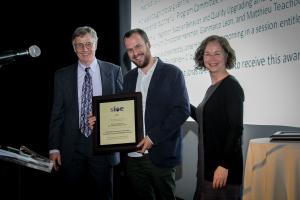By Francine Lafontaine
At the SIOE 2018 conference in Montreal, the Oliver Williamson Best Conference Paper Award for the best paper delivered at the conference was awarded to "Vertical Integration, Supplier Behavior, and Quality Upgrading Among Exporters," by Christopher Hansman (Imperial College London), Jonas Hjort (Columbia University), Gianmarco Leon (Universitat Pompeu Fabra), and Matthieu Teachout (Columbia University).
The 2018 Program Executive Committee preselected a shortlist of papers to be presented at the conference, based on the evaluations and their own assessments of the importance and quality of the submitted papers. Then the entire Program Committee voted on the candidate papers on that shortlist (excluding contributions co-authored by program committee members). The award was accepted by Jonas Hjort (center of the picture, with Bentley MacLeod and Francine Lafontaine). Sincere congratulations to the winners !
The winning paper's abstract is:
We study the relationship between exporters' organizational structure and output quality. If only input quantity is easily observable, theory predicts that vertical integration may be necessary to incentivize suppliers to take input quality-increasing actions. Using direct measures, from the Peruvian fishmeal manufacturing industry, of (i) suppliers' behavior, (ii) suppliers' ownership, (iii) all within- and across-firm supply transactions, (iv) manufacturers' output by quality grade, and (v) all export transactions, we show the following. After integrating with the plant being supplied (before and after integration) and losing access to alternative pay-per-kilo buyers, suppliers take more quality-increasing and less quantity-increasing actions (and vice versa for de-integrations). Integration consequently causally increases output quality, as we show using exogenous variation in firms' access to suppliers they currently own relative to independent suppliers. Finally, we demonstrate that meeting the demand for high quality output is one of firms' motivations for integrating suppliers, while meeting low quality demand is not. We do so both by interacting (instrumented) changes in the relative price of high quality grades with firms' prior location on the quality ladder, and by interacting changes in relative demand from destinations that import high quality grades with firms' prior export destinations.

